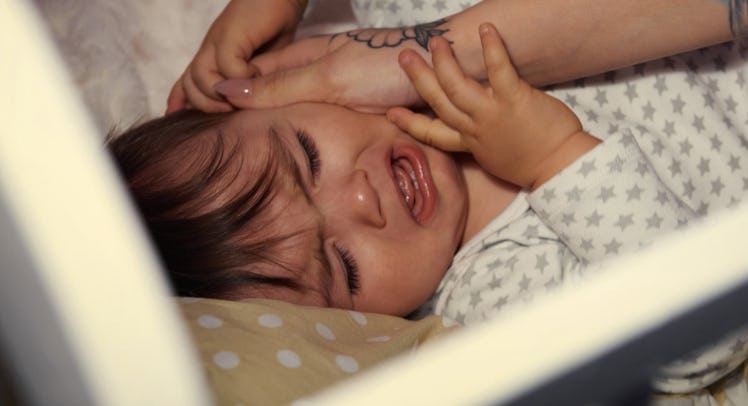Moms With Stronger Opinions About Crying It Out Are Less Happy With Dads
Another reason to talk about sleep training before your kid arrives.

Couples who cannot agree on how to care for their crying babies at night are more likely have troubled relationships, a new study suggests. Researchers found that, when moms had stronger opinions than dads regarding night wakings, there was more co-parenting conflict overall. The findings add to the pile of reasons why couples may want to make sure they’re in agreement about co-sleeping, sleep training, and other bedtime issues prior to having kids.
“We don’t know much about how fathers choose to parent during the night, which was a large part of the inspiration for this study,” coauthor on the study Jonathan Reader of Penn State University told Fatherly.
Most of the research on night wakings focuses solely on mothers—only one prior study (involving barely 50 infants) looked at how both mothers and fathers respond to infant sleep patterns. Studies on parenting conflicts are slightly better-represented in the literature. Past research suggests that couples with similar beliefs about parenting are less likely to raise children with behavioral problems, and more likely to provide stable environments for their kids.
This new study examined data on 167 mothers and 155 fathers obtained from Project SIESTA, a longitudinal study of parenting, infant sleep, and development. Participants were asked how they felt about responding to night wakings when infants were one, three, six, nine and 12 months old. Individuals rated statements such as, “My child will feel abandoned if I don’t respond immediately to his/her cries at night” on a scale of one to five. Questionnaires also gauged couples’ attitudes towards co-parenting and asked about anxiety and depression.
The results suggest that mothers have stronger beliefs about how they should respond to night wakings, overall. And when moms’ beliefs were stronger than their partners, their satisfaction with the co-parenting relationship plummeted. Interestingly, when dads held stronger beliefs about caring for crying infants at night, co-parenting quality was unaffected. “Co-parenting only suffered in families where mothers held stronger beliefs about responding to infant night wakings and not in families where fathers held stronger beliefs,” Reader confirms.
Reader and his colleagues hypothesize that opinionated women’s dissatisfaction with co-parenting had to do with feeling a lack of support around care-taking. If they felt strongly about attending to their infants immediately and their partner did not, the discrepancy may leave it all on them. Still, it’s not as simple as dads being more calm about their kids crying it out. “We were unable to explore the reasons as to why parents might hold stronger or weaker beliefs about responding to infant night wakings,” Reader notes. He recommends future research address that question and analyze at larger, more diverse samples, as the current one focuses primarily on white, heterosexual married couples.
The takeaway for fathers is not necessarily to have stronger opinions, but rather communicate the ones they have about how to respond to their babies at night ahead of time. “Parents should communicate about what their beliefs are prior to the arrival of their infant,” Reader suggests. “If a discrepancy is found in their beliefs, they should work to resolve that difference.” Working is out at 3 a.m. over the howls of a crying baby won’t be good for anyone.
This article was originally published on